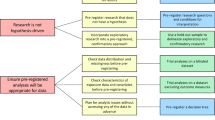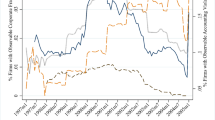Abstract
Studies on health care practices, financing, and organization increasingly rely on Medicare and other expanded data sets. These studies are of critical importance for public policy and for the development of strategies to contain escalating health care costs, but they often use data that have been corrupted by fraud and abuse. Mistaken conclusions, as to the effectiveness of policy and procedures, are likely being reached in studies that have used corrupted data. Researchers need to consider the suspect nature of results obtained from the corrupted data, and determine methods for making the data more valid.
Similar content being viewed by others
References
Armstrong, D., and Zimmerman, R. (2004) Pfizer to Settle Medicaid-Fraud Case; Drug Maker Agrees To Pay About $430 Million in Fines Over Neurontin Marketing. Wall Street Journal (Eastern edition) May 13, A3.
Blustein, J. (1995) Medicare Coverage, Supplemental Insurance, and the Use of Mammography By Older Women. New England Journal of Medicine 332, 1138–1143.
Broad, W., and Wade, N. (1982) Betrayers of the Truth. New York: Simon and Schuster.
Brown, J.G. (1994) A Compendium of Reports and Literature on Coding of Physician Services (OEI-03-91-00921). Washington, D.C.: Inspector General, Department of Health and Human Services.
Brown, J.G. (1999) Interoffice memorandum, to: Nancy-Ann Min DeParle, Administrator, Health Care Financing Administration. January 21, 1999, SUBJECT: monitoring the accuracy of hospital coding (OEI-01-98-00420), http://oig.hhs.gov/oei/reports/oei-01-98-00420.pdf#search=’NancyAnn%20Min%20DeParle%20%20January%2021%2C% 201999%2C%20%20SUBJECT%3A%20monitoring%20the%20accuracy%20of%20hospital%20coding%20%28OEI019800420%29’.
Christian, M.C., McCabe, M.S., Korn, E.L., Abrams, J.S., Kaplan, R.S., and Friedman, M.A. (1995) The National Cancer Institute Audit of the National Surgical Adjuvant Breast and Bowel Project Protocol B-06. New England Journal of Medicine 333, 1469–1475.
Cutler, D.M., and McClellan, M.B. (1998) What Is Technological Change? In Wise, D.A., (Ed.) Inquiries in the Economics of Aging. Chicago: University of Chicago Press.
Dandridge, J.R. (1994) Role of Audit in Managed Care. Paper presented at the 1994 Annual Conference of the National Association of Surveillance and Utilization Review Officials, Seattle, Washington.
DOJ Has Improved Oversight of False Claims Act Guidance (2001) United States General Accounting Office. Report to Congressional Committees. March.
Eldenburg, L., and Kallapur, S. (1997) Changes in Hospital Service Mix and Cost Allocations in Response to Changes in Medicare Reimbursement Schemes. Journal of Accounting and Economics 23, 31–51.
Eldenburg, L., and Kallapur, S. (2000) The Effects of Changes in Cost Allocations on the Assessment of Cost Containment Regulation in Hospitals. Journal of Accounting and Public Policy 19, 97–112.
Escarce, J.J., and McGuire, T.G. (2003) Methods for Using Medicare Data to Compare Procedure Rates among Asians, Blacks, Hispanics, Native Americans, and Whites. Health Services Research 38, 1303–1318.
Glaxo Agrees to $75 m Settlement to End Suit (2004) Boston Business Journal. May 24, http://www.bizjournals.com/boston/stories/2004/05/24/daily11.html.
Gornick, M.E., Eggers, P.W., Reilly, T.W., Mentnech, R.M., Fitterman, L.K., Kucken, L.E., and Vladeck, B.C. (1996) Effects of Race and Income on Mortality and Use of Services Among Medicare Beneficiaries. New England Journal of Medicine 335, 791–799.
Guterman, S., and Dobson, A. (1986) Impact of the Medicare Prospective Payment System for Hospitals. Health Care Financing Review 7, 97–115.
Harrington, K.B. (2003) Clamping down on Upcoding: Government Efforts to Curb a Medicare Billing Fraud and Abuse. The University of Nebraska, Lincoln, unpublished dissertation.
U.S. Department of Health and Human Services and U.S. Department of Justice (2002) Health Care Fraud and Abuse Control Program Annual Report for FY 2001, http://oig.hhs.gov/ reading/hcfac/HCFAC%20Annual%20Report%20FY%202001.htm.
Himelhoch, S., Weller, W.E., Wu, A.W., Anderson, G.F., and Cooper, L.A. (2004) Chronic Medical Illness, Depression, and Use of Acute Medical Services among Medicare Beneficiaries. Medical Care 42, 512–521.
Jesilow, P., Pontell, H.N., and Geis, G. (1993) Prescription for Profit: How Doctors Defraud Medicaid. Berkeley: University of California Press.
Jesilow, P., Geis, G., and Harris, J.C. (1995) Doomed to Repeat Our Errors: Fraud in Emerging Health-care Systems. Social Justice 22, 125–138.
Johnson, L.A. (2004) Medco Settles With States for $ 29 Million Pharmacy Benefits Manager Accused of Changing Medicines to Increase Profit. Washington Post April 27, E04, http://docs.newsbank.com/openurl?ctx_ver=z39.88-2004&rft_id=info:sid/iw.newsbank.com: NewsBank:WPIW&rft_val_format=info:ofi/fmt:kev:mtx:ctx&rft_dat=10238EAE6BB352D7&svc_dat=InfoWeb:aggregated4&req_dat=0D0F9A1261961D4A.
Kessler, D.P., and McClellan, M.B. (2002) The Effects of Hospital Ownership on Medical Productivity. RAND Journal of Economics 33, 488–506.
Klein, D.F. (1991) Scientific Fraud and Misconduct. Journal of Clinical Psychopharmacology 11, 337–339.
Lubitz, J., Beebe, J., and Baker, C. (1995) Longevity and Medicare Expenditures. New England Journal of Medicine 332, 999–1003.
Maltin, V. (2004) Fraud Plagues U.S. Health Care. The Atlanta Journal-Constitution July 13, D1, http://www.ajc.com/news/content/business/0704/14healthfraud.html?Found_Session=true&UrAuth=‘NNUObNXUbTTUWUXUUUZT[UcUWU_UWUZU.
McClish, D., Penberthy, L., and Pugh, A. (2005) Using Medicare Claims to Identify Second Primary Cancers and Recurrences in Order to Supplement a Cancer Registry. Journal of Clinical Epidemiology 56, 760–767.
McNeil Accused of Manipulation (2002) Philadelphia Business Journal July 22.
Mitchell, C. L., Anderson, E. R. Jr., and Braun, L. A. (2003) Billing for Inpatient Hospital Care. American Journal of Health-System Pharmacists 60, S8–S11.
Morgan, R.O., Virnig, B.A., DeVito, C.A., and Persily, N.A. (1997) The Medicare-HMO Revolving Door–The Healthy Go In and the Sick Go Out. New England Journal of Medicine 337, 169–175.
Murphy, S. (2004) Jury Hears Tape of Drug Firm’s Agent Offering Deal to HMO. Boston Globe May 12, B3, http://docs.newsbank.com/openurl?ctx_ver=z39.88-2004&rft_id=info:sid/iw.newsbank.com:NewsBank:BGBK&rft_val_format=info:ofi/fmt:kev:mtx:ctx&rft_dat=10288BA5F1788A9D&svc_dat=InfoWeb:aggregated4&req_dat=0D0F9A1261y961D4A.
National Association of Medical Fraud Control Units (1993) Health Care Provider Fraud: The State Medical Fraud Control Unit Experience. Washington, DC.: The National Association of Medical Fraud Control Units.
Needleman, J., Buerhaus, P. I., Mattke, S., Stewart, M., and Zelevinsky, K. (2003) Measuring Hospital Quality: Can Medicare Data Substitute for All-payer Data? Health Services Research 38, 1487–508.
Pear, R. (1995) Florida Struggles to Lift Medicaid Burden. New York Times (National Edition) April 24, C14.
Pollock, A. V., and Evans, M. (1985) Bias and Fraud in Medical Research: A Review. Journal of the Royal Society of Medicine 78, 937–940.
Prospective Payment Assessment Commission (1992) Medicare and the American Health Care System: Report to Congress. Chicago, IL: Commerce Clearing House.
Psaty, B.M., Boineau, R., Kuller, L.H., and Luepker, R.V. (1999) The Potential Costs of Upcoding for Heart Failure in the United States. The American Journal of Cardiology 84, 108–109.
Schering to Pay $350 Million for Medicaid Fraud (2004) The Star-Ledger (Newark, NJ) July 16, A13, http://docs.newsbank.com/openurl?ctx_ver=z39.88-2004&rft_id=info:sid/iw.newsbank.com:NewsBank:STLB&rft_val_format=info:ofi/fmt:kev:mtx:ctx&rft_dat=103E06D822CE4C96 &svc_dat=InfoWeb:aggregated4&req_dat=0D0F9A1261961D4A.
Silverman, E.M., Skinner, J.S., and Fisher, E.S. (1999) The Association Between For-Profit Hospital Ownership and Increased Medicare Spending. New England Journal of Medicine 341, 420–426.
Silverman, E.M., and Skinner, J.S. (2004) Medicare Upcoding and Hospital Ownership. Journal of Health Economics 23, 369–389.
Soderstrom, N.S. (1990) Are Reporting Errors under PPS Random or Systematic? Inquiry—Blue Cross and Blue Shield Association 27, 234–241.
Taylor, D.H., Whellan, D.J., and Sloan, F.A. (1999) Effects of Admission to a Teaching Hospital on the Cost and Quality of Care for Medicare Beneficiaries. New England Journal of Medicine 340, 293–299.
Traska, M. (1990) Unbundling Could Be Costing You a Bundle. Business and Health 20–27.
United States Files Suit Against Tenet Healthcare Alleging False Claims Billing to Medicare (2003) January 9, http://www.usdoj.gov./opa/pr/2003/January/03_civ_007.htm.
Union Sues Four Largest Pharmacy Benefit Firms (200 3) Milwaukee Journal Sentinel. March 19, D 01, http://docs.newsbank.com/openurl?ctx_ver=z39.88-2004&rft_id=info:sid/iw.newsbank.com:NewsBank:MWSB&rft_val_format=info:ofi/fmt:kev:mtx:ctx&rft_dat=0F9E2F03D3ED2A 6C&svc_dat=InfoWeb:aggregated4&req_dat=0D0F9A1261961D4A.
Author information
Authors and Affiliations
Corresponding author
Rights and permissions
About this article
Cite this article
Jesilow, P. The Effects of Fraud on the Evaluation of Health Care. Health Care Anal 13, 239–245 (2005). https://doi.org/10.1007/s10728-005-6452-x
Issue Date:
DOI: https://doi.org/10.1007/s10728-005-6452-x




